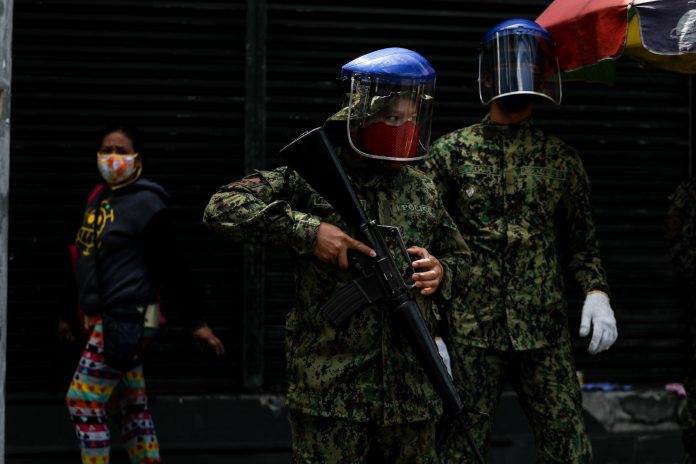With police visibility now more pronounced in Metro Manila and other urban areas amid the COVID-19 pandemic, perhaps the question that should be asked is: Isn’t it one already?
There’s just too many recent examples of the police apparently overstepping the limits of their law enforcement function.
The police motto is “to serve and protect,” but more and more it appears that the current policy is “to arrest and detain” people for even the slightest infractions.
On July 9, a broadcast journalist was arrested by policemen and village officials in Quezon City for taking off his face mask before drinking water from a bottle. After finishing his drink and returning to the store to dispose of the bottle and forgetting to put on his face mask while doing so, that’s when the police accosted him and brought him to a nearby sports stadium where more than 800 others arrested for the same offense were made to undergo a seminar on safety protocols during the pandemic but would also be charged in court and made to pay a fine.
The mass arrest in one day of a big number of people for not wearing a face mask appears too heavy-handed and unreasonable as the police could have simply given each one a face mask as a gesture of kindness and compassion amid the pandemic.
This is not the first time, by any means, where authorities have swooped down on unwary citizens and to arrest and detain them for supposed violations of pandemic restrictions.
Earlier, the police forcibly dispersed a rally along EDSA, the main thoroughfare cutting across Metro Manila, by urban poor asking the government to help them as their families were going hungry as they had lost their jobs and sources of livelihood.
There’s more: a fish vendor in Quezon City was beaten black and blue by village security personnel for not wearing a face mask. Another fish vendor, this time in Navotas City, was also arrested and detained for a week for the same offense.
In Bulacan province north of Manila, a group on a humanitarian mission to distribute food packs and hygiene kits to poor residents in Norzagaray town were also arrested and detained by police for lack of quarantine passes and even charged with inciting to sedition for possession of leaflets critical of government’s inadequate response to the pandemic.
During the first round of the lockdown in Metro Manila, a police officer shot dead an ex-army man suffering from post-traumatic stress syndrome who had been accosted for loitering on a street and refusing to kneel on the ground with hands up. Police claimed he was about to reach for a gun in a sling bag. There was no gun, and the National Bureau of Investigation concluded that the gun supposedly found on his person was planted.
In Caloocan City north of Manila, a small group of jeepney drivers were arrested, detained and charged in court for illegal assembly when they protested the government refusal to let them ply their trade and earn money to support their families.
In Laguna province, youth who took part in a peaceful protest against the anti-terror law were also arrested and detained ostensibly for violation of lockdown protocols against mass gatherings.
And in a spectacular display of shoot-first-ask-questions-later, police killed four army intelligence personnel on an intelligence mission in the strife-torn city of Jolo in Mindanao without any apparent provocation.
But all this pales in comparison to the murder and mayhem involved in the implementation of the Duterte administration’s war on drugs.
The police are saying that about 6,000 drug pushers and users have been killed in legitimate anti-drug operations. But human rights groups believe that as many as 20,000 more have been killed by suspected vigilante groups since 2016.
The law is the law, the government likes to say, but why is it that there is a double standard in the enforcement of laws?
The chief of police in the National Capital Region violated the rules on wearing face masks, social distancing and the prohibition on mass gatherings of more than 10 people during the recent celebration of his birthday. We’re told that he is under investigation and faces sanctions along with four other generals and police personnel, but we have yet to hear if the investigating body agency has rendered a decision. Or was there no investigation to begin with? What we know is that Duterte himself has ignored calls for the general’s ouster and instead vouched for the capabilities of the erring police officer.
And there’s the rub. Duterte has empowered the police to do pretty as they please as he apparently turns a blind eye to their excesses in law enforcement during the COVID-19 lockdowns and in the ongoing war on drugs.
Given this situation where the citizenry fear the police, the military and even civil authorities and the courts, then we no longer live under the rule of law, especially with the anti-terror law now in place. Slowly but surely, the country seems to be transforming into a police state where authorities conveniently ignore human rights and life for ordinary citizens becomes truly nasty, brutish and short.
Ernesto M. Hilario writes on political and social justice issues for various publications in the Philippines. The views and opinions expressed in this article are those of the author and do not necessarily reflect the official editorial position of LiCAS.news.









